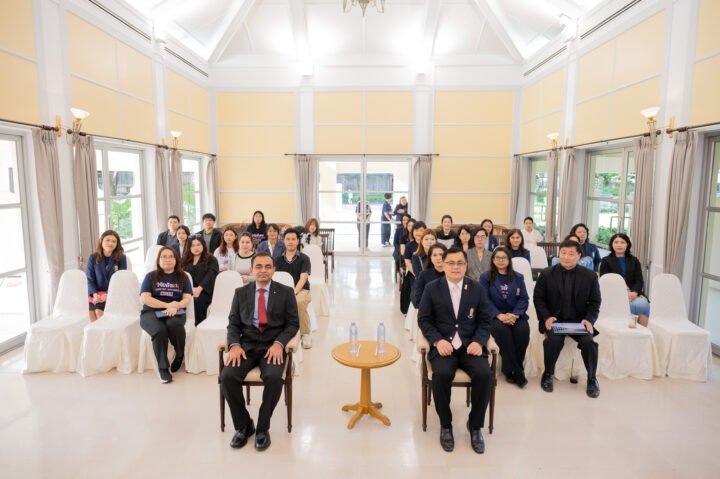AI Research
TCS, CEA partner to advance physical AI research and innovation in France – MarketScreener

AI Research
University of Cincinnati launches AI Ethics Center

CINCINNATI — As artificial intelligence technology continues to evolve at a rapid pace, a group of researchers at the University of Cincinnati is launching a new initiative to ensure that ethics keep up.
Backed by nearly $500,000 in funding from the National Endowment for the Humanities and $165,000 in seed money from UC’s College of Arts and Sciences, the university has announced the formation of the Center for Explainable, Ethical, and Trustworthy AI, or CEET.
“AI looks like it’s going to be one of the most impactful and maybe revolutionary technologies of our lifetime,” said Andre Curtis-Trudel, assistant professor of philosophy at the University of Cincinnati. “That makes it one of the most exciting things to be thinking about, especially from ethical perspectives.”
The center, still in its early stages, will serve as an interdisciplinary hub bringing together faculty and researchers from a wide range of fields, including philosophy, English and physics to address how AI systems are developed, used, and understood.
“AI impacts everyone, but it’s not the case that everyone has the opportunity to contribute to conversations around AI,” Curtis-Trudel said. “In particular, about how it’s being used.”
CEET’s work is split between two main branches: a research team focused on the broader societal and ethical questions surrounding AI, and an engagement team tasked with transforming those findings into public-facing educational initiatives. That includes programming for students in the K-12 system, a key focus of the center’s outreach efforts.
“Students are increasingly going to be asked to use AI tools, and their lives will involve AI in one way or another,” said Curtis-Trudel. “It’s important that they understand how these tools work and are able to reason about them.”
Dean James Mack of UC’s College of Arts and Sciences emphasized the importance of including humanities scholars in the conversation around AI, which he says has traditionally been dominated by science and tech fields.
“This is not just a scientific or technological challenge,” Mack said. “This is a humanistic challenge that’s going to affect society, one that’s going to influence policies, not just in relation to AI but entire communities.”
Mack said the center also aims to help set ethical boundaries that prioritize public safety and social good.
“Every tool that’s in a doctor’s office can always be used to harm or to help,” Mack said. “We have to understand that the goal is to help individuals, not harm them.”
While CEET doesn’t yet have a physical space on campus, Curtis-Trudel hopes the center will position the University of Cincinnati as a national leader in humanities-driven AI research and policy.
“Our aim is to become a first port of call, a hub, for anyone interested in AI ethics,” he said.
Center staff say they are also exploring private partnerships and additional fundraising opportunities to support the initiative’s long-term goals.
AI Research
Driving Innovation in Learning and Research at Chula through AI – Chulalongkorn University

On September 5, 2025, the Social Research Institute of Chulalongkorn University organized an international public lecture titled “AI in Higher Education for Innovation in Learning & Research”, delivered by Dr. Muthu Kumar Chandrasekaran, an expert in artificial intelligence and computer technology and former Applied Science Manager at Amazon AI, at Chula Narumit House. The event was officially opened by Professor Dr. Wilert Puriwat, President of Chulalongkorn University, with Associate Professor Dr. Unruan Leknoi, Director of the Social Research Institute, delivering the welcoming remarks. A panel discussion followed, featuring Dr. Philip Soung Soo Cho, a researcher at Chula’s Social Research Institute.


President, Chulalongkorn University

Director, Social Research Institute, Chulalongkorn University

Expert in Artificial Intelligence and Computer Technology and former Applied Science Manager, Amazon AI
Objectives of the Lecture
The lecture aimed to create a platform for knowledge exchange on Artificial Intelligence (AI) between international experts and Thai academics. It also sought to provide guidance on enhancing the quality of teaching and research in Thai universities to meet global standards.
Elevating Thai Universities to the Global Stage:
The session shared best practices for applying AI to improve teaching and research. The evolution began during the MOOC era (2012–2020), with platforms such as Coursera, Canvas Network, Diversity, and Udacity.
In the pre-Generative AI era, AI applications focused on:
- Automated grading systems
- Assessing participation in online classrooms
- Scripted intelligent tutoring systems
In the current era of Generative AI and Agentic AI, developments have become more personalized, enabling the creation of personal AI tutors and positioning AI as a key tool for future learning.
Building International Networks:
The event brought about greater opportunities for collaboration between Chulalongkorn University and global academic and tech experts, reinforcing Thailand’s role in the international AI discourse.
Empowering Thai Society:
The lecture emphasized the need to equip the new generation with AI literacy, ensuring sustainable innovation. It also stressed the importance of:
- Developing inclusive AI policies
- Investing in technology and education
- Ensuring equitable access to AI tools and infrastructure
Despite AI’s potential to disrupt future labor markets and the growing concern over job displacement, it also presents new career opportunities. To adapt, reskilling and upskilling of the workforce remain essential, as people are the core driving force behind national progress. Sustainable investment in data centers was also highlighted as a key factor.
AI Research
This 30-year-old CEO says his AI negotiator can successfully haggle down the price of a car by thousands of dollars

Zach Shefska claims his artificial intelligence can negotiate better car deals than most humans ever could. The 30-year-old chief executive of CarEdge, which he founded with his father Ray in July 2020, says his company’s AI negotiator has saved customers thousands of dollars by handling the back-and-forth haggling that typically makes car buying such a dreaded experience.
Shefska told Fortune the AI negotiator took about four months to develop. “We launched it on July 17th and have helped over 2,000 paying customers,” he said. The system is built on top of existing large language models but enhanced with CarEdge’s proprietary market insights and negotiation training. “CarEdge creates instances of AI agents that are deployed on behalf of users. The agents have proprietary market insights and negotiation training from CarEdge. Each agent creates a unique email and phone number and contacts dealers on behalf of customers,” Shefska told Fortune.
The idea emerged from a simple frustration. “Consumers don’t want to get screwed,” Shefska told PYMNTS in an interview. “And it’s not even necessarily about getting the best price; it’s just not wanting to be taken advantage of.”
CarEdge’s AI negotiator works simply: Customers specify exactly what vehicle they want, and the AI creates anonymous email addresses and phone numbers to contact dealerships directly. The artificial intelligence then handles all the price negotiations while keeping the buyer’s personal information completely private.
Notably, the service isn’t free. Customers pay $40 for a month of access without auto-renewal. “Customers pay because we do not want car dealers to be flooded with users who are simply testing the tech,” Shefska told Fortune. “The goal is for only those who are highly qualified and serious shoppers to leverage the agent to help save them time and money.”
According to CarEdge, though, the results speak for themselves. In one example cited by the company, CarEdge’s AI negotiated a Toyota RAV4 from an initial dealer quote of $37,356 down to $35,600—a savings of nearly $1,800. Customer testimonials published on CarEdge’s website show even bigger wins, with the company claiming that one man, Brian G., reported CarEdge helped him get a 2023 Chrysler Pacifica Hybrid for “$4,000 under MSRP after fees.” Another customer testimonial on the site, attributed to Wes S., says he secured a 2023 Corvette C8 for $5,000 under sticker price.
“On average the agent saves users over $1,000 and ~5 hours of back and forth with dealers via email and text,” Shefska told Fortune. CarEdge says the AI negotiator has been deployed over 10,000 times since launching, collecting pricing data from thousands of dealerships across the country.
CarEdge
The negotiation advantage
What gives the AI such an edge? Unlike consumers who buy cars every three to five years, the artificial intelligence negotiates deals constantly, learning from each interaction. CarEdge has fed the system six years of pricing data from hundreds of thousands of car transactions, giving it deep insights into what constitutes a fair deal.
The AI also eliminates the emotional and psychological pressures that often derail human negotiations. It doesn’t get flustered by high-pressure sales tactics or feel rushed to make a decision. Instead, it methodically compares offers, identifies hidden fees, and pushes for better terms with the persistence of a seasoned negotiator.
According to CarEdge, one customer looking for a Honda Accord got to experience the benefits firsthand when the AI negotiator managed 13 back-and-forth messages with a dealer and ultimately saved him $1,280 off the original out-the-door price.
Beyond the financial savings, the AI negotiator addresses another major pain point in car shopping: privacy invasion. Traditional car shopping websites often expose buyers to a barrage of spam calls and emails from multiple dealerships. CarEdge’s system flips this dynamic entirely: The AI absorbs all the dealer communications while the customer stays anonymous until they’re ready to make a purchase.
This approach has resonated with consumers increasingly concerned about data privacy. The AI uses what CarEdge calls “protected alias” contact information, ensuring that dealers never get access to the buyer’s real phone number or email address during negotiations.
Buying cars in the future
CarEdge’s AI negotiator represents part of a larger transformation in how high-value transactions are conducted. Just as real estate has buyer’s agents, Shefska envisions a future where AI agents routinely handle complex negotiations on behalf of consumers.
As artificial intelligence becomes more sophisticated and car buying remains one of consumers’ most stressful retail experiences, tools like CarEdge’s AI negotiator may become standard practice. For an industry built on information asymmetry and adversarial relationships, that change can’t come soon enough.
For this story, Fortune used generative AI to help with an initial draft. An editor verified the accuracy of the information before publishing.
-

 Business2 weeks ago
Business2 weeks agoThe Guardian view on Trump and the Fed: independence is no substitute for accountability | Editorial
-
Tools & Platforms4 weeks ago
Building Trust in Military AI Starts with Opening the Black Box – War on the Rocks
-

 Ethics & Policy1 month ago
Ethics & Policy1 month agoSDAIA Supports Saudi Arabia’s Leadership in Shaping Global AI Ethics, Policy, and Research – وكالة الأنباء السعودية
-

 Events & Conferences4 months ago
Events & Conferences4 months agoJourney to 1000 models: Scaling Instagram’s recommendation system
-

 Jobs & Careers2 months ago
Jobs & Careers2 months agoMumbai-based Perplexity Alternative Has 60k+ Users Without Funding
-

 Education2 months ago
Education2 months agoVEX Robotics launches AI-powered classroom robotics system
-

 Podcasts & Talks2 months ago
Podcasts & Talks2 months agoHappy 4th of July! 🎆 Made with Veo 3 in Gemini
-

 Education2 months ago
Education2 months agoMacron says UK and France have duty to tackle illegal migration ‘with humanity, solidarity and firmness’ – UK politics live | Politics
-

 Funding & Business2 months ago
Funding & Business2 months agoKayak and Expedia race to build AI travel agents that turn social posts into itineraries
-

 Podcasts & Talks2 months ago
Podcasts & Talks2 months agoOpenAI 🤝 @teamganassi





















